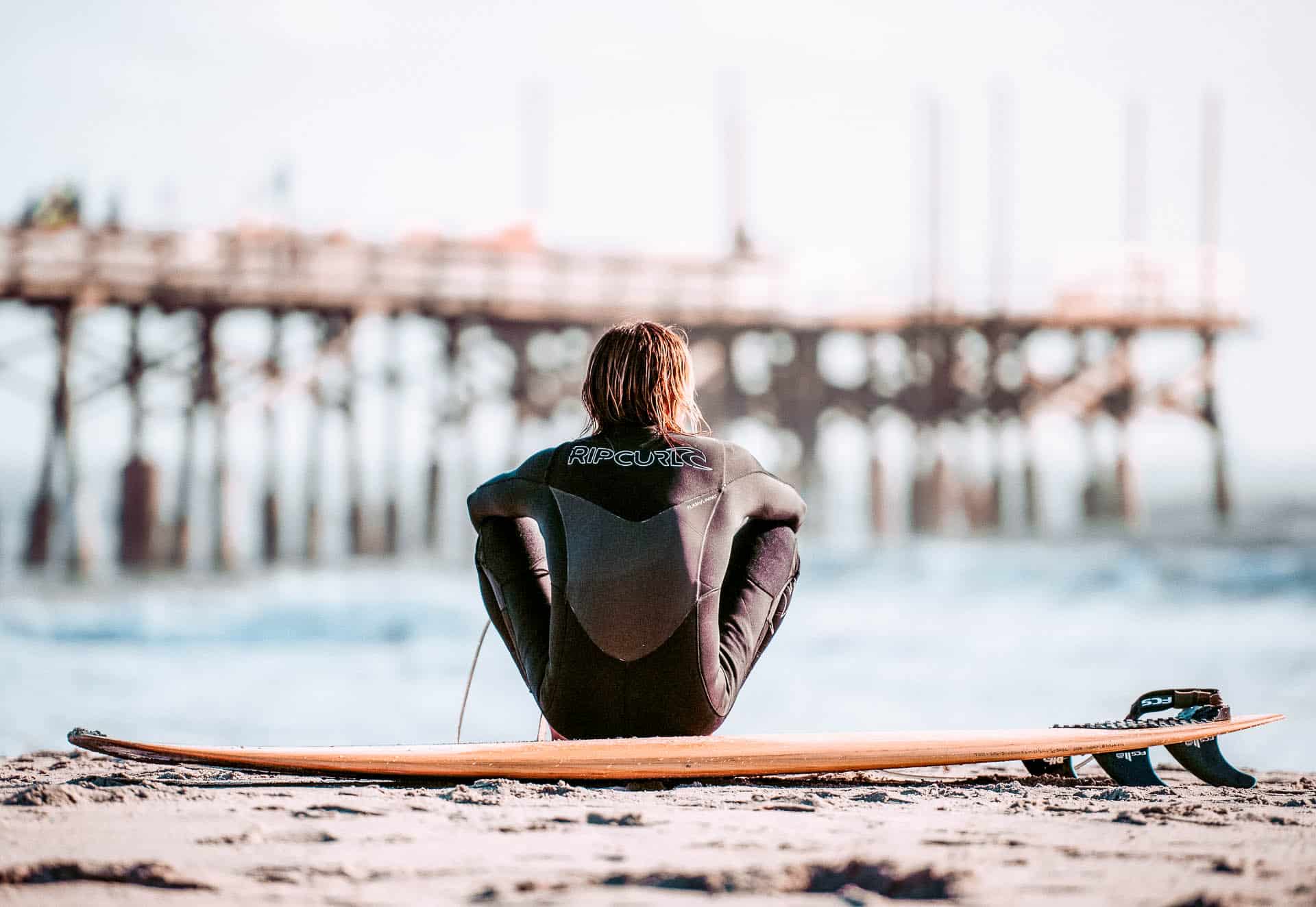From a physical health perspective, surfing is a fantastic form of exercise. It engages several muscle groups, particularly the core, legs, and shoulders, helping to improve strength and overall fitness. Additionally, the constant paddling required while surfing provides a great cardiovascular workout, enhancing endurance and promoting weight loss.
Why is surfing good for you? We know that physical activity, including sports, can have physical as well as psychological health benefits. But what are those particular to surfing? Is surfing better for you than, for example, cycling, karate or softball?
Let’s go over a few of the most beneficial aspects of surfing whether they be physical, mental or more spiritual in nature. Here are 10 reasons why surfing is good for you:
1. Surfing engages all your major muscle groups
Surfing can be considered a “complete sport” because it requires the use of all of the body’s major muscle groups. Simply paddling out to catch a wave engages your triceps, delts and biceps, traps, lats, obliques and stomach muscles — and that’s before you’ve even gotten to your feet. Getting to a standing position or “popping up” requires the use of your pecs, delts, triceps and biceps; followed by the muscles of your legs (mainly quads and gluts) and lower back once you’re standing. Staying upright and riding waves also brings your core muscles — stomach and mid and lower back — even more into play.
By engaging several muscle groups together surfing offers a full-body workout that enhances strength and muscle tone. So, grab your board and hit the waves for a fun and effective workout!
2. It’s a great cardio workout
In order to maintain a healthy heart as well as overall fitness, at least 2.5 hours of aerobic activity are recommended per week. As an energetic and intensive sport, surfing can contribute to maintaining good cardiovascular health. Since surfing is so much fun, for most surfers, 2.5 hours is a piece of cake. If you live near any good surf breaks, you may find yourself spending a lot more of your free time surfing than 2.5 hours a week!
3. Surfing might boost your immune system
Sustained or chronic stress is associated with many negative health issues, including physical ailments such as heart problems and brain tumors as well as depression and other mental illnesses. Short bursts of stress, on the other hand, can bring health benefits. Research from the University of Stanford suggests that acute stress, such as what you experience during thrilling adventure sports like surfing, may actually strengthen your immune system, improving recovery time and even helping your body protect itself from ailments including skin cancer.
4. Surfing makes you smarter??
Further research from Stanford shows that short bursts of stress can enhance memory and learning. Think of how being more alert can heighten cognitive ability. This is at least in part because cortisol, a stress hormone, can sometimes increase brain plasticity, a process in which the brain’s neurons form new synapses and prune old ones. So the thrills you experience catching a wave can help create more neural pathways in your brain, effectively making you smarter.
5. It improves balance and flexibility
The practice of surfing not only strengthens your muscles, but also makes you more dexterous and flexible. Many surfers practice yoga or Pilates to further improve both balance and flexibility, thereby making them better surfers. Stretching is also an important post-warm-up and post-surfing activity to prevent injury and improve performance.
6. You can lose weight while you surf
Intense physical activity, strength training and cardio vascular exercise all help you keep fit and trim. While “losing weight” may be a misnomer since muscle is heavier than fat, surfing will definitely help you burn fat and excess calories. The average surfer burns 400 calories an hour while surfing. Since surfing is so fun, you’re likely to spend more time doing it opposed to other grueling or boring forms of exercise.
7. Experience better mental health
Exercise, spending time outside, having active interests, being social, relaxing… all these aspects of surfing help improve one’s general mental health in a variety of ways:
- Simply being outdoors and appreciating the beauty of the natural world can encourage a sense of wellbeing.
- Being engaged in a hobby can improve your focus in life and provide a sense of purpose.
- Surfing is also a social activity in which you can meet interesting new friends from many different walks of life.
- Just being out in the ocean is both a relaxing and simultaneously invigorating experience.
Maintaining a positive state of mind and overall well-being is crucial for a fulfilling life. With the stresses and demands of daily life, it can often feel challenging to maintain a consistently positive mood. However, there are numerous ways to boost one’s mood and overall well-being. Engaging in regular physical activity, such as exercise or sports, has long been touted as a natural mood enhancer. Physical activity releases endorphins, also known as the “feel-good” hormones, which can significantly improve one’s mood and lead to a greater sense of happiness.
8. Surfing broadens your horizons
The search for newer, different and better breaks can lead you to all corners of the world. Surfing encourages you to experience new cultures and natural environments in places like Bali, California, South Africa, Portugal, Brazil, Australia, Hawaii, Morocco and Costa Rica. Meet fellow travellers and friendly locals the world over. Nothing broadens the mind like travel and getting to know new people. You may even meet a new work colleague or future spouse among your fellow members of the global surfing community!
9. Need perspective? Hit the waves!
Nothing grounds you like being knocked over and pushed underwater by a big wave. There’s no point in being angry, you saw how big it was and decided to surf it anyway. When surfing you can feel powerful in that you can ride something so awesome and vast, or you can realize how small you are and how incredible the Earth is. The surf isn’t something you fight — it’s something you try to harmonize with. Shouldn’t we be like that with other aspects of the world?
10. Make more friends
One of the most effective ways to meet like-minded individuals is by joining communities or groups centered around your interests.The sense of community within the surfing culture is a unique and powerful aspect that draws travelers in. Surfing is not just a sport or a hobby; it is a way of life, a culture that transcends boundaries. Traveling to different destinations to experience new surf spots allows surfers to immerse themselves in diverse cultures and connect with each other.
So what are you waiting for? Grab your surfboards and head to one of the best surf camps in Bali by Rapture Surfcamp, at Green Bowl and Padang Padang to enjoy all the benefits listed above and more!
FAQs
To begin surfing, you’ll need some essential equipment. This includes a surfboard, a leash to keep the board attached to you, a wetsuit if you’re in colder waters, wax for traction on the board, and sunscreen to protect your skin from the sun’s rays. Beginners often find it helpful to start with a longboard, typically around 8 to 10 feet in length, as it offers stability and ease of paddling.
Selecting the right surfboard is crucial for beginners. It’s recommended to start with a foam board or soft-top longboard as they offer forgiveness and stability while you’re learning. Consider factors such as your weight, height, and the type of waves you’ll be surfing when choosing a board that suits you best.
Proper paddling technique is essential for catching waves and navigating through the water efficiently. Focus on maintaining proper arm positioning, utilizing your core muscles, and timing your strokes with the rhythm of the waves. Practicing good paddling technique will greatly improve your surfing experience.
Safety should always be a top priority when surfing, especially for beginners. Always surf in designated areas with lifeguards present, and familiarize yourself with basic safety protocols such as identifying rip currents and understanding surfing etiquette. Start in smaller waves, respect other surfers in the water, and never turn your back on the ocean.
Improving your balance and stability is key to progressing as a surfer. Practice pop-ups on land to build muscle memory and focus on keeping your weight centered with slightly bent knees while riding waves. Engage your core muscles to maintain stability and a low center of gravity, which will help you stay upright on the board.
If you’re struggling to catch waves, focus on positioning yourself correctly in the lineup where the waves are breaking. Paddle with enough speed to match the wave’s momentum, and time your paddling efforts to coincide with the wave’s peak. It may take some practice, but with patience and persistence, you’ll improve your wave-catching skills.
Transitioning from white-water waves to unbroken waves is a natural progression in surfing. Start by riding white-water waves to gain confidence and practice your balance. As you become more comfortable, move to the outside lineup and practice catching unbroken waves. Focus on efficient paddling and timing your take-off to match the wave’s speed.
When surfing among more experienced surfers, it’s important to be mindful and respectful. Always yield to those riding the wave and communicate with other surfers to avoid collisions. Start in less crowded areas to build confidence, and gradually move to busier lineups as you gain experience and become more comfortable.
Getting caught in a wave or experiencing a wipeout is a common part of surfing. Stay calm and protect your head by covering it with your arms. Hold onto your board to prevent it from hitting you or others, and wait for the wave to pass before resurfacing. With practice, you’ll become more adept at handling wipeouts safely.
Improvement in surfing comes with regular practice and dedication. Take lessons from certified instructors to learn proper techniques and safety measures. Watch experienced surfers to observe their movements and strategies, and most importantly, enjoy the process of learning and mastering this exhilarating sport!


